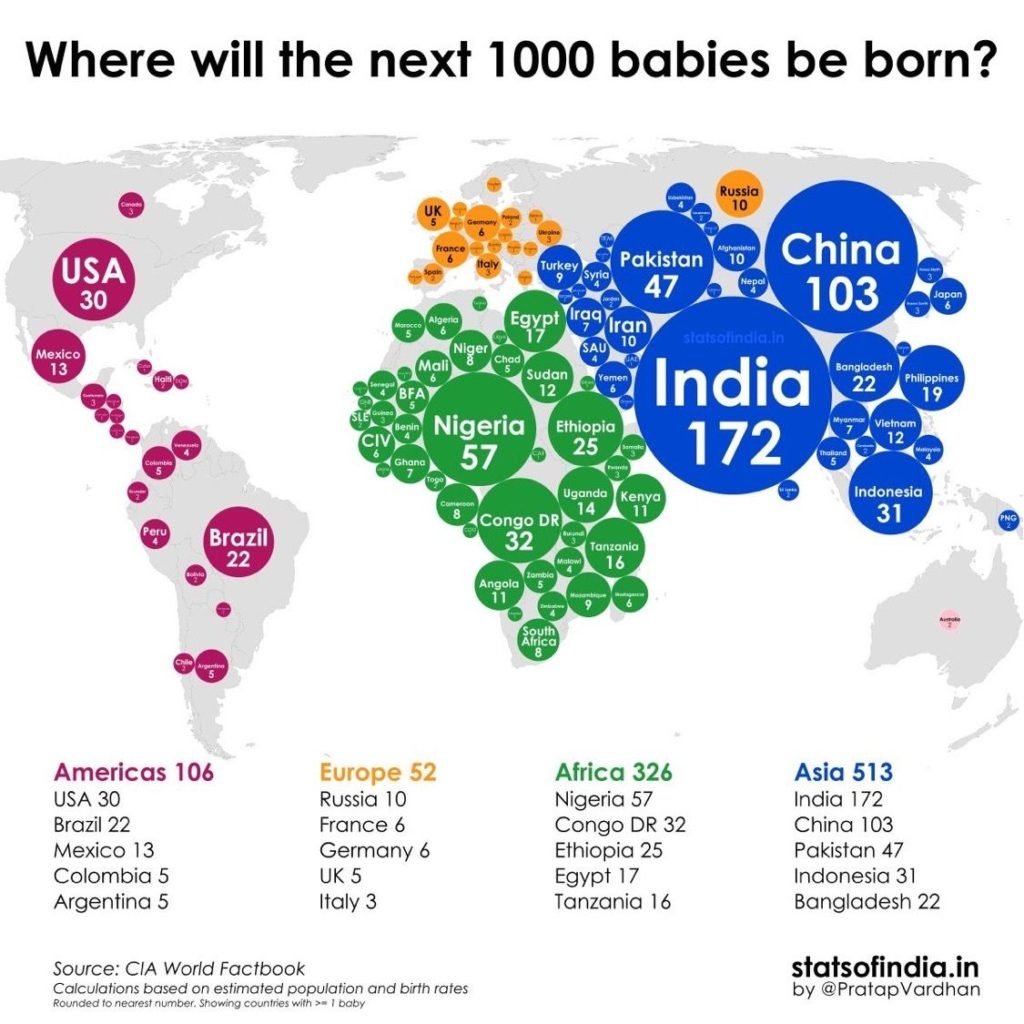We’ve gone from “Too many people!” a generation ago to “Not enough babies!” now. I don’t get either worry.
Let’s take Europe as an example. Currently its population is about 740 million, and one projection is that by the year 2100 its population will decline to 600 million.
And some commentators go “Yikes!”
Why?

Possibility One: The under-replacement means that “Europe is dying out.” Really? Europe’s population in 1960 was about 600 million people. Was Europe dead then? Or dying? Or economically and culturally moribund? Why can’t Europeans flourish with 700 million, or 500 million, or whatever number?
Possibility Two: The fear is that other nations’ populations are increasing. E.g., India has high-than-replacement birthrates, so the ratio of Europeans to Indians will fall from, say the current 1:2 to 1:3. But why is that anything to worry about? Is there some proper population ratio of Europeans-to-Indians we must strive for?
Possibility Three: “This EU average of 1.5 children per woman falls far below the 2.1 needed for population stability.” The key word here is “stability.” Does that means the European goal should be to have the same number of people every generation? Why?
Possibility Four: The fear is that not enough European babies will grow up to be taxpayers to support everyone on welfare and pay European governments’ debt interest. So “Don’t threaten the welfare state” is the impulse?
Possibilities Five, Six, and more: The values threatened are economic prosperity? Environmental sustainability? Maintenance of cultural traditions? Relative superiority? Military preparedness? …
More possibilities welcome. What is supposed to be the correct number of Europeans, and how is that number to be determined?
I have had the same question. Whenever I hear the claims especially on declining population there is never a concrete reason as to why. There seems to be the assumption that if you need to have the why explained its probably beyond you anyway. My sense is that there is a subconscious realization that altruism requires growing population because of a combination of the factors you list. Altruism leads to declining productivity, group warfare, destructive economic wealth redistribution and environmental damage and destruction, people know this but it would be hard to say outright:
“If we want to make sacrificing lives primary we need more lives to sacrifice.”
Hi Chris
Altruism is found in some animals, monkeys. It is just a totally natural social function. Which in humans, develops, to different degrees according to each one. Altruism has nothing to do with an ideology, destructive, nihilistic, socialist, or communist.
Magpies would be altruistic. They have been there for a very long time.
And human altruism did not cause our demise.
Should I see in your comment a reflection coming from Ayn Rand?
On the question of altruism, it seemed to me that Ayn Rand had come to become sectarian, rejecting everything, not just socialism, which could lead to the idea of altruism. But I do not know her very well.
I do not think she observed bonobo monkeys, among others. But maybe I’m wrong.
The bonobo monkey would have been there for about a million years despite his altruism (and without any socialist bureaucracy 🙂 )
Best!
There are people who like to scare people. Either there are too many or there are not enough…
This way, it allows governments to make plans and tell people how to live and how not to live.
“So our technocrats who spent months in their offices, thought about it, here is the solution…”
There is also a neo-Malthusian movement that scares children.
“It’s the end of time! Everything is going to burn! We have the solutions to save you!” (yes, they always have THE solution…With the taxpayer’s money that will have to obey 🙂 )
Oh, man!